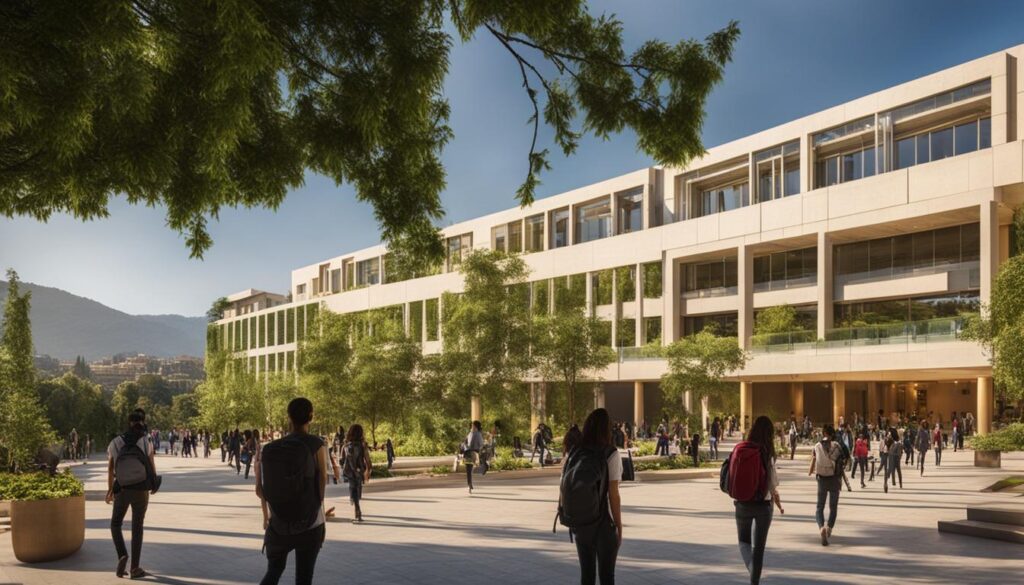Established in 1952, the Lebanese University in Lebanon is a shining beacon of higher education in Lebanon, dedicated to serving the needs of its diverse citizenry. With numerous campuses throughout the country and a wide array of Lebanese University faculties, this public institution offers an inclusive and accessible educational experience for students from various walks of life. For more information on the university’s programs and campus life, visit the official Lebanese University website.
Key Takeaways
- Lebanese University is an esteemed institution of higher education in Lebanon.
- The university offers diverse programs through its multiple faculties and campuses.
- Instruction at Lebanese University primarily takes place in Arabic, with mandatory foreign language studies.
- Lebanese University’s public status ensures greater accessibility and inclusion for students from various socio-economic backgrounds.
- In addition to its academic programs, Lebanese University also fosters a thriving campus life and culture for its students.
- Prospective students can find useful resources and guides to navigate the admissions process on the Lebanese University website.
Understanding the Lebanese University’s Historical Significance and Modern Evolution
Lebanese University has played a vital role in providing equal access to higher education, establishing itself as one of the top universities in Lebanon. Throughout its rich history, this public institution has continuously evolved, expanding its presence by adding new campuses to accommodate the diverse needs of Lebanon’s citizens. From its humble beginnings, the Lebanese University has faced several challenges, including overcrowding and dependency on state funding. Nevertheless, the institution’s resilience and commitment to education have remained unwavering, reflecting its historical significance within the Lebanese community.
Lebanese University’s perseverance has been a driving force in its ability to consistently provide quality education for citizens from lower-income groups, even during times of strife such as the Lebanese Civil War.
With a plethora of departments and faculties, the Lebanese University fosters a robust academic atmosphere, striving to meet the challenges of a modern academic landscape head-on. The institution’s commitment to excellence has made it a leading choice for students in Lebanon, as evident not just by its long-standing historical significance, but also by its positive influence on the present Lebanese community.
| Year | Historical Milestone | Significance |
|---|---|---|
| 1952 | Establishment of Lebanese University | Democratization of higher education in Lebanon |
| 1975 – 1990 | Lebanese Civil War | Highlighting the resilience and commitment to education during turbulent times |
| 1990s – Present | Expansion and growth | Continued advancement in addressing socio-economic disparities in the Lebanese educational landscape |
The Lebanese University continues to make strides in its evolution, cementing its position as a bastion of knowledge, innovation, and inclusivity. In the face of adversity, the institution holds steadfast to its core values and maintains an unwavering dedication to providing quality higher education for all.
Academic Excellence and Diverse Programs at Lebanese University
The Lebanese University champions innovative and patient-centered training, particularly noticeable in the Faculty of Pharmacy, which, since its independence from the Faculty of Medical Sciences in 1993, has thrived on multidisciplinary approaches and collaborative research efforts. Full-time and part-time academic staff are actively engaged in both basic and clinical research, advancing knowledge across pharmaceutical fields.
Cutting-Edge Research and Innovative Education
In pursuit of providing the best university education in Lebanon, the Lebanese University prioritizes cutting-edge research and innovative teaching methods. The institution nurtures research-based learning to ensure its students and faculty members are continually learning and engaging with their respective fields.
Lebanese University is dedicated to promoting research, innovation, and the creation of new knowledge, placing it among the best universities in Lebanon.
Lebanese University Programs and Degrees Overview
Lebanese University offers a wide range of programs and degrees, suited for students with diverse ambitions and career goals. Here’s an overview of the different degree types and programs offered:
| Degree Type | Example Programs |
|---|---|
| Undergraduate | Bachelor of Science, Bachelor of Arts, Bachelor of Business Administration |
| Professional and Research Masters | Master of Clinical Pharmacy, Master of Business Administration in Pharmaceutical Management, Master in Industrial Cosmetology |
| Doctor in Pharmacy Practice | Doctor of Pharmacy Degree, with further specializations available within diverse faculties at the Lebanese University or in collaboration with other institutions |
With a focus on skills acquisition, these programs prepare students for various pharmaceutical professions and other industries, ensuring high employability rates among graduates.
International Collaboration and Exchange Opportunities
Lebanese University values international collaboration and exchange opportunities, opening doors for its students to gain global perspectives in their respective fields. As an institution that encourages a culture of innovation and communication, the university continually seeks to expand its partnership networks, enhancing the educational and research opportunities for its students and faculty alike.
- Partnerships with universities across the world
- Exchange programs for students to study abroad
- Joint research initiatives with international institutions
These collaborations contribute to the Lebanese University’s rankings and reputation, making it one of the leading academic institutions in the nation.
Student Life and Campus Culture at Lebanese University

Student life at Lebanese University is both fulfilling and immersive, offering students an environment that nurtures personal growth and fosters a strong sense of community. A variety of initiatives and support systems contribute to creating a positive campus culture, helping students to make the most of their academic journey.
One of the key events that shape the Lebanese University student experience is the annual “Welcome Day” event. This tradition is dedicated to integrating new students into the faculty community by offering them a chance to interact with one another, build connections, and learn more about available resources and campus life.
Administrative structures within the university provide continuous support to students, ensuring their academic journey is smooth and well-guided. By offering essential services, such as academic counseling, career advice, and health and wellness support, students at Lebanese University can access a variety of resources designed to enhance their overall experience.
Another crucial aspect of student life at Lebanese University is the collaborative environment within the campus. Students can easily engage in academic cooperation and social connections, leading to a friendly and encouraging setting that promotes both academic success and personal growth.
Lebanese University campus culture is further enhanced by a vibrant range of extracurricular activities, including:
- Clubs and societies catering to various interests, from sports and culture to politics and environmental concerns
- Frequent events and workshops aimed at fostering personal development and skill-building
- Opportunities to participate in volunteer work and community service projects
Lebanese University encourages a sense of camaraderie and promotes a rich and diverse campus culture that shapes the foundation for a well-rounded and fulfilling student life.
In conclusion, the student life and campus culture at Lebanese University offer a nurturing and supportive environment in which students can explore their personal and academic potential. Through a variety of initiatives, events, and resources, the university provides a holistic experience that fosters success, well-being, and a sense of belonging among its students.
Navigating the Admissions Process at Lebanese University
The process to apply to Lebanese University is aimed at facilitating student access to its programs. Starting from the engagement of prospective students with accessible and comprehensive guides, the university lays out clear instructions, including information regarding the curriculum and examinations. These resources are pivotal in streamlining the application process for interested individuals.
Steps to Apply to Lebanese University
- Visit the Lebanese University website and review the offered programs and faculties.
- Check the eligibility criteria and requirements for the chosen program.
- Take note of application deadlines, submission guidelines, and necessary supporting documents.
- Complete the online application form and submit the required documentation.
- Monitor your application status and respond to any additional requests for information or documents.
- Once accepted into the university, follow the registration process and prepare for your academic journey.
Key Admissions Dates and Deadlines
Adherence to admissions dates and deadlines is fundamental to securing a place at Lebanese University. While specific dates are updated annually, the institution maintains regular communication to keep prospective students informed about critical timelines, ensuring their opportunity to become part of the university’s diverse and dynamic community.
| Event | Typical Timeframe |
|---|---|
| Online Application Period | January – February |
| Admission Exams | March – April |
| Results Announcement | May – June |
| Registration for Accepted Students | July – August |
| Start of the Academic Year | September – October |
Resources for Prospective Students
Lebanese University’s commitment to prospective students is evident through the provision of comprehensive guides and resources that detail the facets of student life, administrative support, and academic programs. These resources act as a primary touchpoint for students to assimilate information regarding their potential academic pathway within the university.
- Lebanese University website: Provides information about the institution, faculties, admission criteria, and news about the university.
- Faculty websites: Each faculty has a specific website for program offerings, research opportunities, and faculty-specific resources.
- Online brochures: Detailed information about the various programs, including course content, objectives, and outcomes.
- Admission guides: Step-by-step guides for completing and submitting an online application, with specific instructions for both local and international students.
- Student services: Assistance with housing, scholarships, and other support services for students accepted into the university.
Conclusion
Lebanese University has long served as a cornerstone of Lebanon’s educational landscape by providing quality academic programs and fostering an environment that encourages intellectual and professional growth. A wide range of degree programs, dedication to cutting-edge research, and a rich campus life allure students from diverse backgrounds to explore their potential.
The institution’s commitment to excellence and its drive to serve the educational needs of Lebanon’s society have ensured Lebanese University’s enduring reputation as a premier destination for higher education in the country. Some of the major draws include its consistent focus on promoting academic innovation and fostering international collaborations and exchange opportunities for its students.
Those looking to enroll at Lebanese University can anticipate a seamless application process facilitated by accessible resources and guides. As Lebanon’s foremost public academic institution, Lebanese University remains steadfast in its mission to provide quality education, shaping the future of generations to come.
FAQ
What faculties are offered at the Lebanese University?
The Lebanese University offers a wide range of faculties including law, political science, management, engineering, humanities, education, social sciences, fine arts, journalism, business administration, and agriculture.
What degree programs and courses are available at Lebanese University?
Lebanese University offers programs ranging from undergraduate to professional and research masters, covering various fields such as clinical pharmacy, pharmaceutical MBA, and industrial cosmetology.
Are there international collaboration and exchange opportunities at Lebanese University?
Yes, Lebanese University places great value on international collaboration and exchange programs, providing students with the opportunity to gain global perspectives in their respective fields and enhancing educational and research opportunities for both students and faculty.
What is the student life like at Lebanese University?
Student life at Lebanese University is enriched by initiatives like “Welcome Day” which help integrate new students into the faculty community. Administrative structures provide continuous support to students, ensuring their academic journey is smooth and well-guided.
How do I apply to the Lebanese University and what is the admissions process like?
The application process to the Lebanese University starts with engaging prospective students through accessible guides detailing curriculum, examinations, and key admission dates and deadlines. Adherence to deadlines is fundamental for securing a place at the university. Lebanese University maintains regular communication to keep prospective students informed about critical timelines.
Are there resources available for prospective students at Lebanese University?
Yes, Lebanese University provides comprehensive guides and resources detailing the facets of student life, administrative support, and academic programs, acting as primary touchpoints for students to assimilate information regarding their potential academic pathway at the institution.

